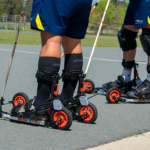Beyond the Royal Commission into Defence and Veteran Suicide: The Role of Sport
Invictus Australia acknowledges the Government’s response to the findings and recommendations of the Royal Commission into Defence and Veteran Suicide, published today, December 2nd, 2024. While we welcome the response, it is a cautious first step. As a society, if we are to properly address the tragic circumstances and impact of defence and veteran suicide, we must do more.
It is not acceptable that on average three veterans take their own life every fortnight in Australia.
Invictus Australia aims to strengthen the wellbeing of veterans and their families through the power of sport. Leveraging a unique position that connects sport with the defence community – locally, nationally and internationally.
Sport has been proven as an impactful tool in maintaining or improving physical and mental wellbeing. However, it remains an underutilised tool in addressing many of the systemic and wellbeing issues identified by the Royal Commission.
As a leading national organisation advocating for the power and utilisation of sport, along with our partners, we offer Government our support to address this underutilisation and deliver better outcomes for veterans and their families.
To guide our efforts, Invictus Australia has recently completed a unique research paper, compiled by Dr Miranda Van Hoof, consolidating all available evidence on the value and benefits of sport for the defence community. This comprehensive analysis is the first of its kind in Australia and highlights the critical role sport can play in:
- Enhancing mental health by reducing symptoms of anxiety, depression, and post-traumatic stress.
- Strengthening physical health and combatting lifestyle-related conditions.
- Building social connections that help veterans and their families feel included and supported.
- Supporting identity reconstruction and a renewed sense of purpose during and after military service.
- Fostering leadership, teamwork, and resilience, skills that are transferable to civilian life.
This evidence base not only confirms the transformative power of sport but also identifies clear pathways to improve how it is used to support veterans and their families. It will underpin Invictus Australia’s future strategy and activities, ensuring our programs and initiatives deliver measurable, meaningful outcomes.
We are committed to sharing these findings widely, and building upon them, to drive collaboration across sectors. By partnering with DVA and Defence, ex-service organisations, health providers, and sporting bodies, we can align our collective efforts and build a coordinated approach to addressing the challenges highlighted by the Royal Commission. A broad, sector-wide strategy will ensure resources are used effectively, duplication reduced, and veterans and their families receive the support they need.
The next Invictus Games will take place in Canada, 8-16 February 2025. A global event that shines a spotlight on many of the issues veterans and their families are experiencing and, importantly, solutions. While the Games are on, Invictus Australia remains focused on how we support veterans and their families beyond the Games. This includes:
- Expanding access to community sport and recreation programs to ensure all veterans and their families can participate, regardless of their location or circumstances.
- Creating more opportunities for competition and volunteering through regional and inclusive formats like Junior and Masters Games.
- Building stronger connections between defence, ex-service organisations, and sporting bodies to deliver better support for those transitioning to civilian life.
- Investing in early intervention initiatives that use sport to promote social connections, mental health, and employability confidence.
- Developing evidence-based programs informed by our research to ensure resources are directed to initiatives that deliver real, measurable benefits.
By connecting organisations across the Defence, Veteran, Sport, and Health sectors, we aim to enable the systemic change required to better support veterans and their families. Together, through collaboration and a shared commitment to leveraging the power of sport, we can build a stronger, healthier future for our defence community.
The evidence is clear: sport is more than just a game—it is a powerful vehicle for recovery, rehabilitation, and reintegration.






